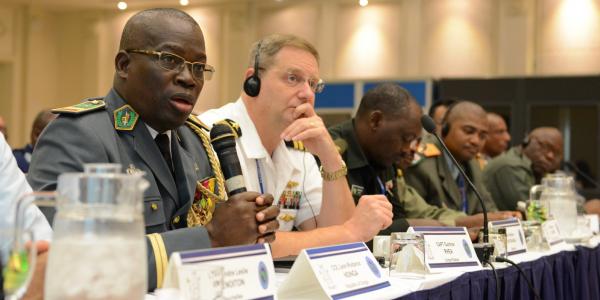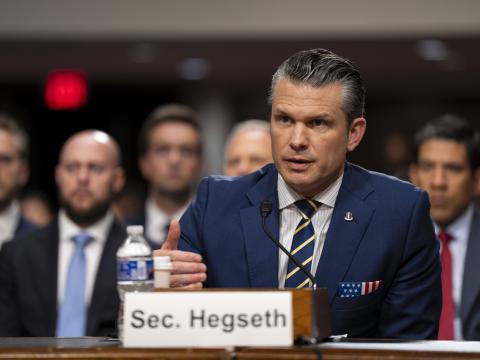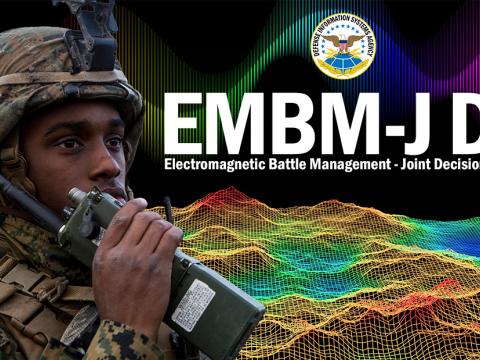AFRICOM Endeavors to Build Communication Capabilities
Fears of new terrorist attacks and growing violence in many African countries highlight a key tenet of U.S. Africa Command’s theater campaign strategy—to work with partner nations across the continent to improve readiness, interoperability and capabilities to support humanitarian assistance, disaster response and peacekeeping operations.
The escalation in fighting between government forces and insurgents increasingly torments a number of Africa’s states as militaries grapple with the havoc wrought by terrorist organizations such as Boko Haram in Nigeria, al-Shabab in Somalia or the expanding Islamic State of Iraq and the Levant in Libya. Political instability and civil wars also threaten the region.
Clearly, the continent faces numerous security challenges, but as with many of the world’s fastest-growing economies, it is also a land of great opportunity. That is why the United States is committed to a coordinated government effort to assist African partner nations in building governments and security and defense institutions that reach beyond training for military operations. This approach provides a foundation of capabilities that can go a long way toward combating other regional problems such as drug smuggling, piracy, illegal fishing and human trafficking.
In the communications realm, the annual Africa Endeavor (AE) senior leader symposium embodies the U.S. effort, bringing together leaders to discuss standardized processes and procedures to improve interoperability. Primary goals of the symposium are to decrease the training time for mission support for African nations that have partnered with the U.S. military and to ensure that their command, control, communications and computers (C4) capabilities can support peacekeeping or humanitarian missions.
The Botswana Defense Force (BDF) and U.S. Africa Command (AFRICOM) co-hosted AE 2015 in August in Gaborone, the capital of Botswana. Senior communications leaders representing some 40 African and European countries gathered to discuss strategic challenges, share operational lessons learned and identify interoperability objectives.
The AFRICOM Communications Directorate works with a broad range of mission partners to develop African nations’ C4 capacity. The AE symposium, AFRICOM’s premiere operational and strategic communications event, enhances military communications, interoperability and information sharing across the continent.
“By talking together, face to face, about current systems and capabilities, we also can develop shared architecture and infrastructure that will allow better integration of our systems when it’s time for mission execution,” said Lt. Gen. Robert Ferrell, USA, the Army’s chief information officer, during the AE 2015 closing ceremony.
There was no shortage of expertise at the symposium as AFRICOM tapped skillful leaders from a wide variety of organizations to assist with training. Presenters from a broad range of African national and regional organizations as well as international groups participated in the event, sharing a vast scope of perspectives and fresh ideas to address communications challenges in Africa. Organizations represented included the United Nations, the African Union (AU), NATO, BDF, the Africa Center for Strategic Studies and the George C. Marshall European Center for Security Studies. Officials converged at the symposium, along with members from industry, to engage in small-group exercises, panels and briefings discussing topics such as cyber defense, cloud services, interagency operations and procedural interoperability—the core areas for African partners to standardize communication in peacekeeping and humanitarian assistance scenarios. Participants shared valuable experiences from multinational military operations in Mali, Somalia and the Central African Republic as well as the U.S. military’s response to the Ebola outbreak in West Africa in 2014 that killed more than 11,000 people.
“Challenges that are affecting Africa are broad in nature and vary from one region to another,” said BDF Brig. Kenneth Kethibogile, director of communications. “There is no one country that has all of the resources to handle these challenges by itself, hence, the need to think and prepare to operate in a multinational and multiagency environment.”
The symposium also serves as a venue to share resources such as handbooks, training products and online collaboration portals that aim to enhance information sharing and sustain interoperability for a diverse set of multinational partners. AFRICOM released during the symposium its first printed edition of the Africa C4 Handbook, which is the culmination of ideas and collaborations from across the AE community. In addition, the U.N. presented copies of its Peacekeeping Missions Military Signals Unit Manual.
“It is critically important that individual militaries, regionally based organizations and the African Union adopt the AU handbook and use it on a daily basis,” Gen. Ferrell said.
While AE’s focus is military, U.S. Ambassador to Botswana Earl R. Miller urged AE participants to improve how they communicate with civil authorities. “We know, domestically, in response to a natural disaster, the military is often the first responder on the scene—or second only to the local police,” Miller said during the 2015 closing ceremony. “However, other government ministries likewise play a role in the response, bringing much-needed expertise and support to their communities.”
The next AE will be held in August in Madagascar and will focus on enhancing civil, military and technical interoperability, cyber collaboration and multinational joint task force operations. Past exercises have taken place in Nigeria, Gabon, Ghana, Gambia and Cameroon.
“It is one thing coming here to talk and agree, but it is always another in ensuring that we deliver on the commitments you’ve made,” said Segakweng Tsiane, the permanent secretary at the Botswana Ministry of Defense, Justice and Security. “One assumes you are leaving this place having achieved multilateral cooperation and alignment of thought and ideas as well as real-time knowledge, which is vital in tackling many security challenges.” Last year, she urged participants to share what they learned with military officials in their home countries.
As long as the African continent faces a broad range of natural and human threats, it is more important than ever to develop the communications capabilities that will enhance responses to those threats. AE provides a forum not only to build the technical skills of all participants, but also establishes the key relationships and the “human interoperability” that are perhaps the most important ingredients in the success of future events and operations.
Col. Patrick C. Dedham, USA, is the director of communications for AFRICOM, based in Stuttgart, Germany. The views expressed here are his alone and do not represent the views of the U.S. Defense Department, U.S. Army or AFRICOM.





Comments